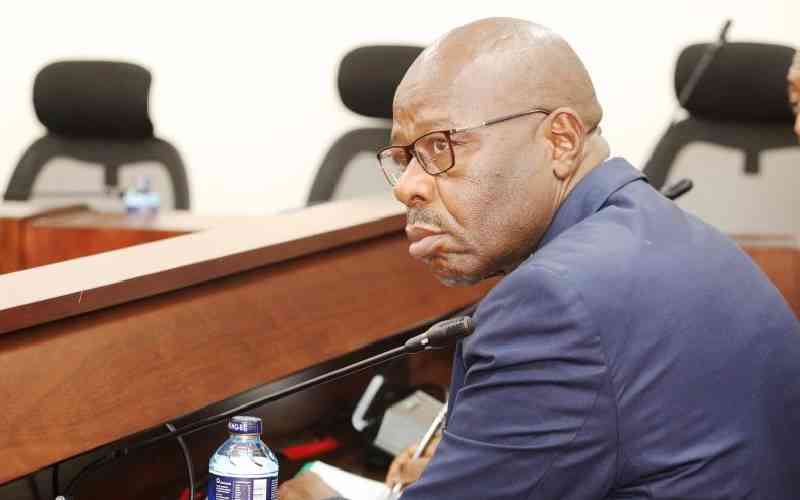The National Treasury has faulted county governments for failure to remit pension deductions, with the Ministry noting that the devolved units are at risk of condemning their staff to old-age poverty.
Treasury Cabinet Secretary John Mbadi said unremitted pension debt by the counties has ballooned to over Shh103 billion.
This is a growth of more than fourfold from Sh23.3 billion, which was the pension debt that the counties inherited from local authorities at the onset of devolution.
Mbadi described the failure to remit pension deductions as unjust and criminal, adding that the failure to forward these funds to pension schemes is robbing people of their future.
He also noted that non-remittance, while most pronounced at the county level, is also present within the national government.
Mbadi, who spoke yesterday at the Devolution Conference, noted that county governments had developed notoriety in their failure to remit deductions to the various pension schemes.
“Analysis of data on unremitted pension contributions indicates that a substantial amount of pension debt is due from the county governments.
“Pension debt by the county governments has accumulated over the years from Sh23.3 billion relating to the defunct local authorities (pre-devolution) to over Sh103.2 billion as at October 31, 2024,” he said, citing data from the Local Authorities Trust Fund, the National Social Security Fund, the Public Service Superannuation Fund and the County Pension Fund.
“This is criminal. If you are supposed to pay salary to your staff and part of that salary is supposed to go to their pension, there is no rationale to pay part of the salary and leave the rest with the county to implement other things or pay for other things. It is not fair, it is unjust because this money belongs to people and when they retire, they want to go home with something.”
“You are killing the future of people. He added. ‘‘Whatever it takes, we must now start the culture of remitting all deductions to where they should be remitted.
County governments have in the past cited delays by Treasury to disbursing funds as among the factors that have seen them experience financial difficulties that have led to delays in payment of salaries but also poor service delivery to the public.
The delays by Treasury have been on account of different factors including shortfall in revenue collection as well as differences between the National Assembly and the Senate on the sharing of revenue between the national government and the counties.
The Chairman of the Council of Governors, Ahmed Abdullahi, defended his colleagues by arguing that some errors made in the past make it difficult for county governments to clear the pension debt.
“The pension debt is a serious issue that counties may not clear easily. I will discuss with Mbadi how the situation can be salvaged because there are some past mistakes which complicate the matter,” Abdullahi said.
Stay informed. Subscribe to our newsletter
Yesterday, Mbadi called on Parliament to fast-track track enactment of the revenue-sharing bills.
The Division of Revenue Act (DoRA) and County Allocation Revenue Act (CARA) define how the two levels of government share revenues and have always been subject to lengthy debates in Parliament.
“Delays in the enactment of the County Government Allocation Bill have become a perennial problem leading to late disbursements, disruption in service delivery and low absorption of additional allocation at the county level.
‘‘It has also led to fiscal inefficiencies, resulting in additional costs to the country in the form of commitment fees and interest charge on foreign borrowing,” said Mbadi.
“I would like to call upon Parliament to support the government in fast-tracking the bills to ensure funds are disbursed and absorbed in a timely manner.”
He added that this year has been different following the government working closely with Parliament. There has been little opposition following the close working relations following last year’s formation of the broad-based government, in which the Kenya Kwanza administration has co-opted opposition into supporting government projects.
“For the first time since devolution began, we were able to agree on shareable revenue and have the Division of Revenue Bill assented to before June 30. This came about because of cooperation and understanding between the national government, the two arms of the legislature and the Council of Governors,” said Mbadi.
“I know the funds are not enough but we are progressively moving to where we will be allocating enough resources to support service provision to our counties,”
He added that Treasury had transferred all the resources in terms of shareable revenue to the counties before the end of the financial year, including the arrears of previous financial year
“Last Monday, we managed to transfer the July allocation to the counties and I want to give a commitment that we will continue to prioritise funding to counties. We will be releasing money in good time for our counties to move and provide services to our people,” he said.
The Devolution Conference took place between August 12 to 15 in Homa Bay County, running under the theme “For the People, For Prosperity: Devolution as a Catalyst for Equity, Inclusion, and Social Justice”.
Mbadi noted that in the about one and a half decades that Kenya has been implementing devolution, it has emerged a key catalyst for change in the country.
“By bringing resources, decision making and services closer to the people, devolution has opened new pathways for inclusive growth, job creation and equitable development across 47 counties. It has allowed previously marginalised areas to access infrastructure, health services, education and economic opportunities, narrowing historical inequalities that have long hindered national cohesion,” he said.
“When effectively managed, devolution becomes an engine that not only drives economic expansion but also ensures prosperity is felt in every village across our nation.
‘‘However, to continue to achieve this prosperity, public finance management reforms are critical in both levels of government.”
Mbadi also said the government would continue to undertake reforms across different sectors aimed at improving livelihoods of Kenyans.
These include education sector reforms through the improvement of infrastructure in learning institutions and strengthening linkages between industry and training institutions to enhance education at all levels.
He added that priority would be given to recruitment and training of teachers as the enrolment of school children of pre-primary age to schools.
He also said the Kenya Kwanza government had in three years recruited 76,000 teachers against a target of 100,000 teachers in five years. It plans to recruit another 24,000 in December and January.
Mbadi said the government would support the expansion of the school feeding programme.
He also said that in addition to TVETs in 52 constituencies currently underway, the government would also equip 72 existing TVET institutions, recruit 2,000 technical trainers and instructors and establish incubation centres and introduce online learning at TVET institutions.
Other interventions aimed at improving the rural economies, Mbadi said, include availing more funds to improve universal healthcare, the Kenya rural financing inclusion facility project, credit guarantee schemes to support MSMEs and components within the Kenya Mortgage Refinance Company that are aimed at supporting affordable housing programme.
He also said Treasury has disbursed Sh7 billion to the counties as part of the second tranche of the County Climate Resilience investment grants under the Financing Locally-Led Climate Action (FLLoCA) Programme.
“These initiatives are beginning to bring positive results,” he said.
“The financing under FLLoCA marks a significant milestone in Kenya’s climate financing architecture, reinforcing the country’s commitment to locally led, community-driven climate action. The funding allows counties to put in place climate change action plans and invest in priority initiatives tailored to their unique vulnerabilities.”
Deputy President Prof. Kithure Kindiki, who closed the conference, assured governors that the Kenya Kwanza government is committed to strengthening devolution.
“The national government has remitted all funds for the last financial year to county governments. Our objective is to ensure counties get adequate resources for implementing development,” Kindiki said.
He hailed devolution as a key avenue for service delivery to citizens.

























